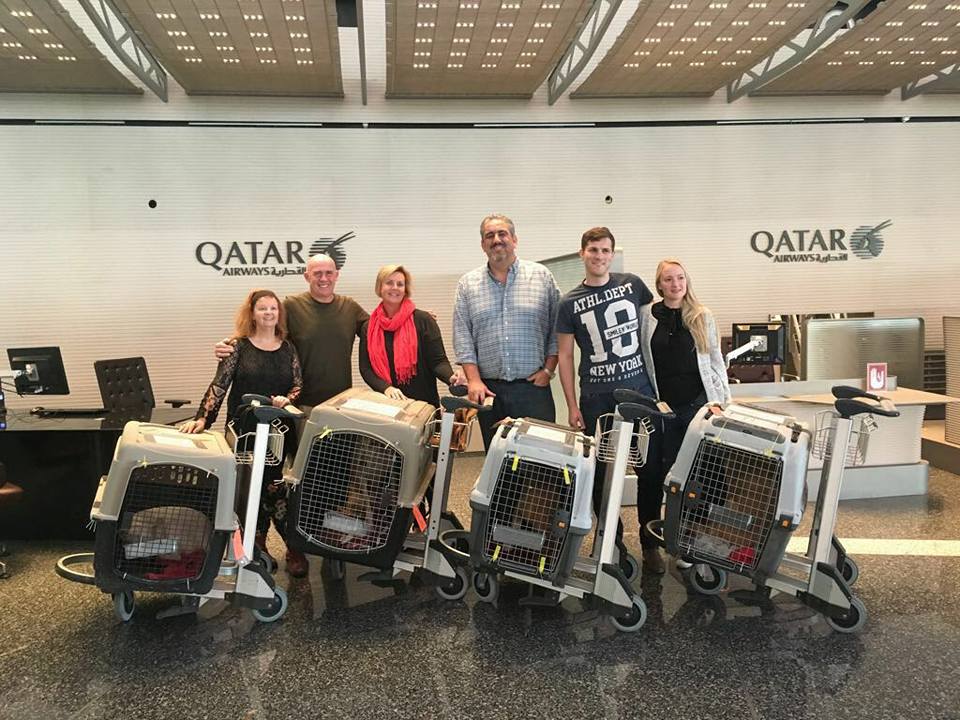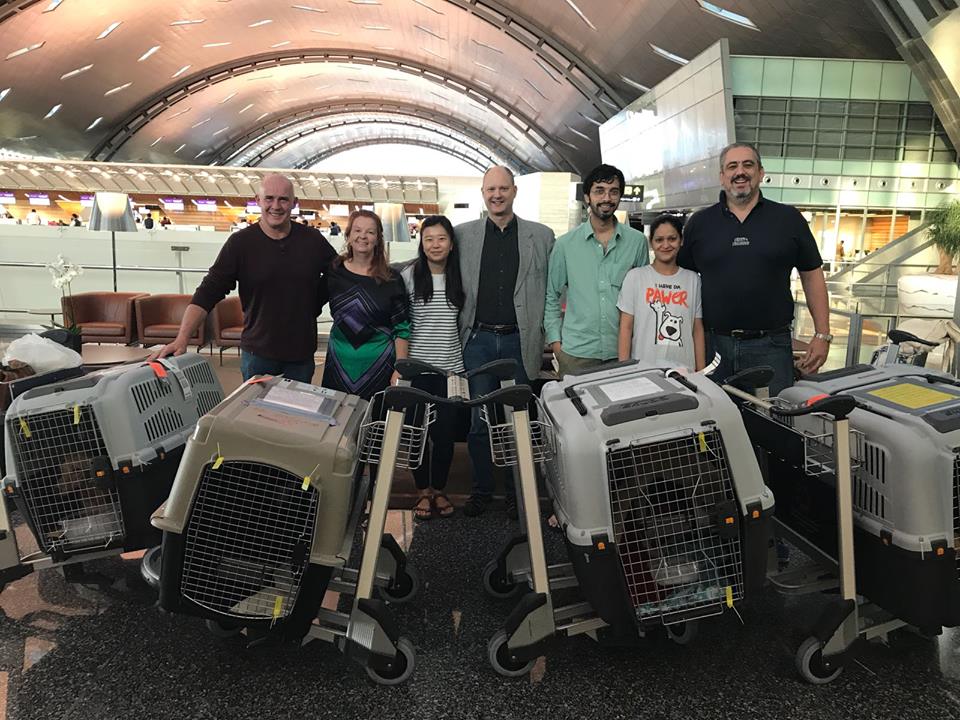We have heard of rescue shelters and weekend feeding teams for the homeless dogs in Qatar. Meet BarkinQ, an active group of 50 dog-loving volunteers, who focus on rehoming homeless dogs all the way to the United States of America.
Donja El Gendy, British expat in Qatar, together with her friend and support from her husband, started BarkinQ in 2016 following a Facebook posting highlighting the fact that there were a number of stray dogs with litters running around with no support of food nor shelter. The summer heat was approaching, and these dogs were being seen on the building sites across the country, especially on the G ring road.
They organised a puppy adoption event series to rehome puppies. At these events a number of people offered support and the group slowly grew to about 10 people. A number of the puppies were rehomed; however, over the next few days these dogs were either returned or thrown on the streets, sold to pet shops.
This made them realise the absence of long-term benefit to the puppies to be rehomed in Qatar and made a formal decision to find a way to get the animals out of the country.
Donja speaks to Marhaba about the group’s activities.
What has been the progress over time ? How many volunteers did you start with and how many do you have today?
We started with three ladies and a few like-minded volunteers. Today, the group has 50 active members. The volunteers are split across a number of different groups namely Rescuers/Supporters, Foster Families and Flight Buddies.
We are constantly seeking foster families and flight buddies as we are a foster based approach and these 2 groups are the major limiting factors apart from the financial aspect.
We have been very lucky to be supported by 3 vet clinics and a kennel, this support has been deeply instrumental in our success. The vets have supported special cases and helped tremendously with our mission to get the dogs out of the country.
The Government Vet has also been very supportive as they recognise the focus on charity work.
How do you go about finding homes for rescue dogs overseas? Do you only send dogs to the USA?
We have connected with an ex-resident of Qatar who is now based in the USA, who rescued animals when she was here. She has an established network with Non-Kill organisations that foster dogs.
At the moment, we send dogs only to the USA. Europe requires a rabies test and an additional term of 90 days required prior to flights. We do not have the ability to home dogs for an additional 90 days nor do we have the finances to keep dogs for an additional period.

Are these dogs homed in a shelter or do they go directly to new homes?
We are a foster based charity and do not believe in putting dogs in a shelter.
Out of all of the dogs only one was sent to a shelter as it was paralysed from chest down, this dog went to a special rehabilitation shelter and it is now on a long-term rehabilitation programme learning to use a wheeled chariot to get around.
The dogs stay in temporary homes in the USA for an average of 3 weeks before they are adopted into their forever homes.
What happens if a dog is too sick or traumatised to travel? You mentioned that dogs are fostered for a maximum of 2 months only
We have had dogs with broken backs, broken legs, blind, beaten, burnt. We have had a few exceptional fosterers who have helped with special cases, sometimes the rehabilitation has taken 6 months.
So far we have managed to get all of our dogs out of the country, however this has been a major challenge as sometimes the dog is traumatised due to cruelty. Cruelty takes many forms: being beaten and not trusting any human, being left in the desert when people leave the country, being treated cruelly caged and beaten.
We have helped scarred and vicious fighting dogs, racing salukis left staked in the desert, dogs left in houses when the owner leaves the country for good and also numerous dogs in the desert that are in packs.
Our success is mainly due to the incredible support of the volunteers, especially one group in Al Wakra, they are amazing.
Funds are required to ship dogs, is it always through donations or fundraisers? Are transport costs ever paid by people adopting the dogs?
Funding is a huge challenge. Initial vet fees and re-operations can come around to thousands of riyals. In addition to fees per dog to process their documents and health checks prior to flights. Vaccination and microchipping come around QAR1,000, shipping crate around QAR1,000, flight costs vary depending on weight. On an average, the expense per rescued dog comes around QAR3,700.
In the past 18 months, we have sent over 200 dogs to the USA, including 10 special cases that needed extensive vet care. The total expense so far has crossed QAR600,000. We are trying to run campaigns to raise money for this cause.
We regularly conduct dog education events in return for food contribution. This will be used for the dogs in foster care.
Very rarely do we receive adoption fees, this is normally when a dog arrives in the USA and is immediately adopted (5-10% direct adoptions approximately USD300/dog), or sometimes the rescue groups share some of their adoptions fees with us when they get our dogs adopted, but this doesn’t even cover the crate cost for each dog.
How can people volunteer to foster or be a flight buddy?
Word of mouth is the most powerful tool as we take great care to make the experience of the flight buddy as relaxed as possible and ask them to share the experience.
They normally contact us directly after seeing Facebook postings, we then share a detailed document regarding flight buddy and they understand that there is no impact upon their baggage allowances.
Are specific requirements with regard to foster homes? For example, does the home have to be a villa so that the dog has more space or is an apartment?
The housing of the dog is all dependent upon the attitude of the fosterer, there are some people who have a restricted place of abode however they walk the dog 4 times a day.
We are very careful about the housing of the dogs as 90% of the time we are dealing with untrained puppies who chew and are not toilet trained.
So the fosterers need to understand that there is a negative side to any fostering – so far, our screening has resulted in a 90% success rate.
People often ask to adopt the dogs here in QATAR but we do not allow this as we cannot take the risk. We went through very bad experiences and our main priority is our dogs welfare.’
If you would like to foster, be a flight buddy or donate, follow BarkinQ on Facebook.









